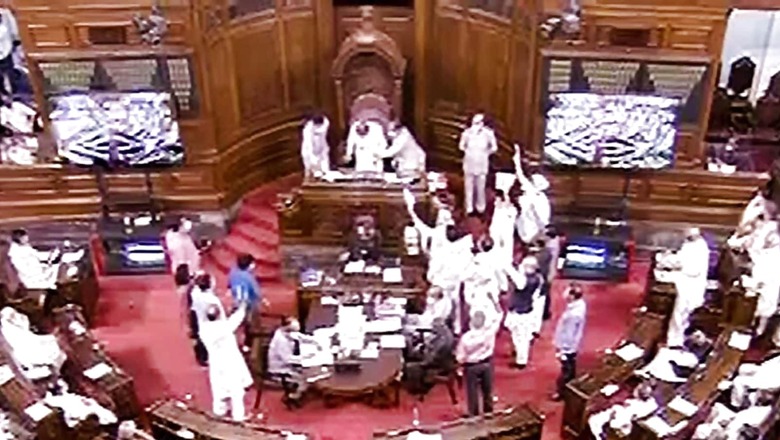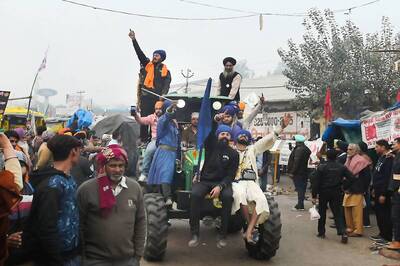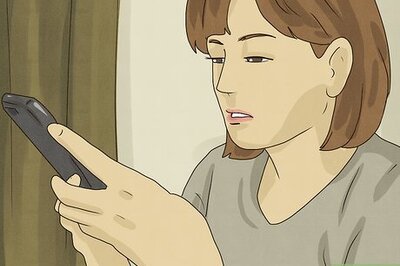
views
12 Rajya Sabha MPs were suspended for the rest of the 2021 Winter Session right on its first day for “complete abuse of rules of the House” and “violent behaviour” during the preceding Monsoon Session of Parliament earlier this year. The Houses of Parliament can often be witness to tumultuous scenes and can see matters get out of hand as members lock horns on contentious issues. It is the duty of the Speaker of Lok Sabha and the Chair in Rajya Sabha to ensure order and they are vested with certain powers to ensure that decorum is maintained during proceedings, suspension of members being one of them. Here’s what you need to know about how a member is penalised for being out of line with parliamentary etiquette.
What Kind Of Actions Can Invite Suspension?
Suspension is a serious matter and, for both Houses of Parliament, may be triggered by the same set of circumstances. According to rules 256 and 374, respectively, in the Rules of Procedure and Conduct of Business for Rajya Sabha and Lok Sabha, the presiding officer is permitted to, upon deeming it necessary, “name a member who disregards the authority of the Chair or abuses the rules… by persistently and wilfully obstructing the business thereof”.
The act of ‘naming’ of such a member paves the way for a motion to be moved in that House on the question that the member thus ‘named’ be “suspended from the service (of the House) for a period not exceeding the remainder of the session”. This motion is generally subjected to a voice vote, as was the case with TMC MP Shantanu Sen in Rajya Sabha during the Monsoon session of 2021 after he had snatched from the hands of IT Minister Ashwini Vaishnaw and torn them. Once the motion is passed, the suspended MP is required to “forthwith quit the precincts” of the House.
For both Houses, the rules provide that such suspension can stand terminated if that House, passes a motion to that effect.
ALSO READ: A ‘Potent’ Panel For Probes: Why Joint Parliamentary Committees Are Set Up, How They Work
What Is The Rule For Ordering Withdrawal By An MP?
The rules of procedure also provide for the presiding officer to order temporary ‘withdrawal’ of a member. According to rules 255 and 373, respectively, in the Rajya Sabha and Lok Sabha rulebooks, the presiding officer “may direct any member whose conduct (is deemed in her or his) opinion grossly disorderly to withdraw immediately from the Council”.
But such withdrawal applies only for the duration of the day on which it was made. “…(A)ny member so ordered to withdraw shall do so forthwith and shall remain absent during the remainder of the day’s sitting”.
Are The Powers Of Presiding Officers Same Vis-a-Vis Such Actions?
In fact, there is an additional provision in the Lok Sabha rules — which does not exist for Rajya Sabha — that allows the Speaker to suspend a member without the need for a motion in that regard being brought in the House. Rule 374A, which was introduced in 2001, says that “…(I)n the event of grave disorder occasioned by a member coming into the well of the House or abusing the Rules of the House persistently and wilfully obstructing its business by shouting slogans or otherwise, such member shall, on being named by the Speaker, stand automatically suspended from the service of the House for five consecutive sittings or the remainder of the session, whichever is less”.
While the Lok Sabha MP in question has to immediately withdraw from the House upon the announcement of such suspension, here, too, the House may revoke the suspension at any time by passing a motion to that effect.
What Are The Guidelines On Apt Behaviour By An MP?
There are elaborate rules of behaviour and conduct laid down for MPs, which they are ideally expected to conform to. However, as noted by the ‘Rules of Conduct and Parliamentary Etiquette‘ of Rajya Sabha, “what precisely constitutes an unbecoming or unworthy conduct has not been exhaustively defined”.
Even so, it states that the “behaviour of members should be such as to enhance the dignity of the House and its members”. It implies that “the conduct of members should not be contrary to the usage or derogatory to the dignity or prestige of the House or in any way inconsistent with the standards which the House is entitled to expect of its members”.

















Comments
0 comment